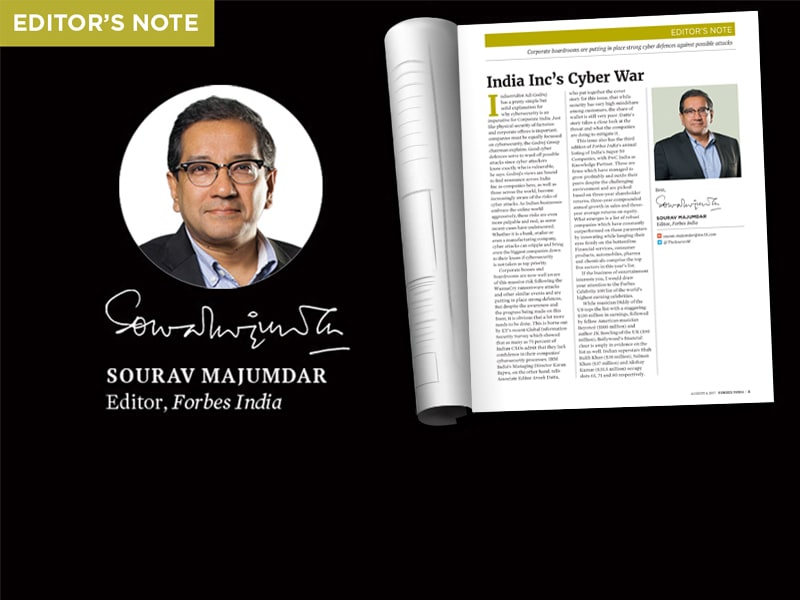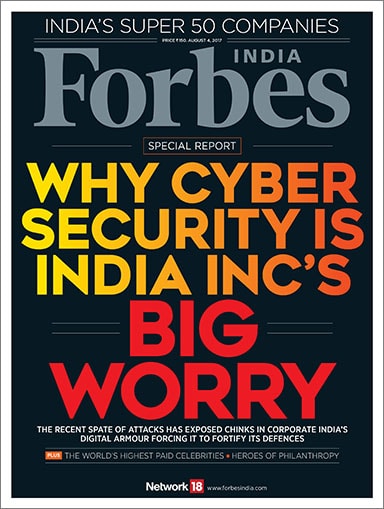India Inc's cyber war
Corporate boardrooms are putting in place strong cyber defences against possible attacks


 Industrialist Adi Godrej has a pretty simple but solid explanation for why cybersecurity is an imperative for Corporate India. Just like physical security of factories and corporate offices is important, companies must be equally focussed on cybersecurity, the Godrej Group chairman explains. Good cyber defences serve to ward off possible attacks since cyber attackers know exactly who is vulnerable, he says. Godrej’s views are bound to find resonance across India Inc as companies here, as well as those across the world, become increasingly aware of the risks of cyber attacks. As Indian businesses embrace the online world aggressively, these risks are even more palpable and real, as some recent cases have underscored. Whether it is a bank, etailer or even a manufacturing company, cyber attacks can cripple and bring even the biggest companies down to their knees if cybersecurity is not taken as top priority.
Industrialist Adi Godrej has a pretty simple but solid explanation for why cybersecurity is an imperative for Corporate India. Just like physical security of factories and corporate offices is important, companies must be equally focussed on cybersecurity, the Godrej Group chairman explains. Good cyber defences serve to ward off possible attacks since cyber attackers know exactly who is vulnerable, he says. Godrej’s views are bound to find resonance across India Inc as companies here, as well as those across the world, become increasingly aware of the risks of cyber attacks. As Indian businesses embrace the online world aggressively, these risks are even more palpable and real, as some recent cases have underscored. Whether it is a bank, etailer or even a manufacturing company, cyber attacks can cripple and bring even the biggest companies down to their knees if cybersecurity is not taken as top priority.  Corporate bosses and boardrooms are now well aware of this massive risk following the WannaCry ransomware attacks and other similar events and are putting in place strong defences. But despite the awareness and the progress being made on this front, it is obvious that a lot more needs to be done. This is borne out by EY’s recent Global Information Security Survey which showed that as many as 75 percent of Indian CXOs admit that they lack confidence in their companies’ cybersecurity processes. IBM India’s Managing Director Karan Bajwa, on the other hand, tells Associate Editor Aveek Datta, who put together the cover story for this issue, that while security has very high mindshare among customers, the share of wallet is still very poor. Datta’s story takes a close look at the threat and what the companies are doing to mitigate it.
Corporate bosses and boardrooms are now well aware of this massive risk following the WannaCry ransomware attacks and other similar events and are putting in place strong defences. But despite the awareness and the progress being made on this front, it is obvious that a lot more needs to be done. This is borne out by EY’s recent Global Information Security Survey which showed that as many as 75 percent of Indian CXOs admit that they lack confidence in their companies’ cybersecurity processes. IBM India’s Managing Director Karan Bajwa, on the other hand, tells Associate Editor Aveek Datta, who put together the cover story for this issue, that while security has very high mindshare among customers, the share of wallet is still very poor. Datta’s story takes a close look at the threat and what the companies are doing to mitigate it.
This issue also has the third edition of Forbes India’s annual listing of India’s Super 50 Companies, with PwC India as Knowledge Partner. These are firms which have managed to grow profitably and outdo their peers despite the challenging environment and are picked based on three-year shareholder returns, three-year compounded annual growth in sales and three-year average returns on equity. What emerges is a list of robust companies which have constantly outperformed on these parameters by innovating while keeping their eyes firmly on the bottomline. Financial services, consumer products, automobiles, pharma and chemicals comprise the top five sectors in this year’s list.
If the business of entertainment interests you, I would draw your attention to the Forbes Celebrity 100 list of the world’s highest earning celebrities.
While musician Diddy of the US tops the list with a staggering $130 million in earnings, followed by fellow American musician Beyoncé ($105 million) and author JK Rowling of the UK ($95 million), Bollywood’s financial clout is amply in evidence on the list as well. Indian superstars Shah Rukh Khan ($38 million), Salman Khan ($37 million) and Akshay Kumar ($35.5 million) occupy slots 65, 71 and 80 respectively.
Best,
Sourav Majumdar
Editor, Forbes India
Email:sourav.majumdar@nw18.com
Twitter id:@TheSouravM
First Published: Jul 20, 2017, 06:52
Subscribe Now